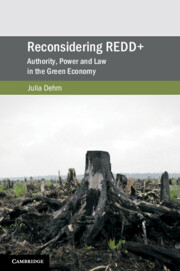Book contents
- Reconsidering REDD+
- Cambridge Studies on Environment, Energy and Natural Resources Governance
- Reconsidering REDD+
- Copyright page
- Contents
- Acknowledgements
- Abbreviations
- Introduction
- 1 Background to REDD+
- 2 Asserting Global Authority over the Carbon Sequestration Potential of Forests
- 3 Actualising Authority through Public and Private Law
- 4 Responsibility and Capacity
- 5 Scale, Multilevel Governance and the Disaggregation of Property Rights in REDD+
- 6 REDD+ at the ‘Local’ Level
- 7 Conclusion
- Bibliography
- Index
6 - REDD+ at the ‘Local’ Level
Between Rights and Responsibilisation
Published online by Cambridge University Press: 13 May 2021
- Reconsidering REDD+
- Cambridge Studies on Environment, Energy and Natural Resources Governance
- Reconsidering REDD+
- Copyright page
- Contents
- Acknowledgements
- Abbreviations
- Introduction
- 1 Background to REDD+
- 2 Asserting Global Authority over the Carbon Sequestration Potential of Forests
- 3 Actualising Authority through Public and Private Law
- 4 Responsibility and Capacity
- 5 Scale, Multilevel Governance and the Disaggregation of Property Rights in REDD+
- 6 REDD+ at the ‘Local’ Level
- 7 Conclusion
- Bibliography
- Index
Summary
This chapter examines the fraught terrain of REDD+ implementation ‘on the ground’, with a specific focus on three strategies that have been central to efforts towards social safeguards: benefit sharing, tenure reform, and rights to consultation and to free, prior and informed consent (FPIC). It reads these three strategies as mechanisms for mediating the potential tensions between different – and potentially competing – demands: those ‘from below’, for rights and recognition, and imperatives ‘from above’, for ensuring that specific obligations are enforceable through the responsibilisation of local actors. This chapter examines how these competing demands play out in REDD+ implementation and suggests that these three strategies might not necessarily be emancipatory for people living in and around forested areas, but rather they may operate to facilitate the greater disciplinary inclusion of forest peoples in the ‘green economy’ and thereby further consolidate the actualisation of new forms of global authority through REDD+.
Keywords
Information
- Type
- Chapter
- Information
- Reconsidering REDD+Authority, Power and Law in the Green Economy, pp. 294 - 350Publisher: Cambridge University PressPrint publication year: 2021
